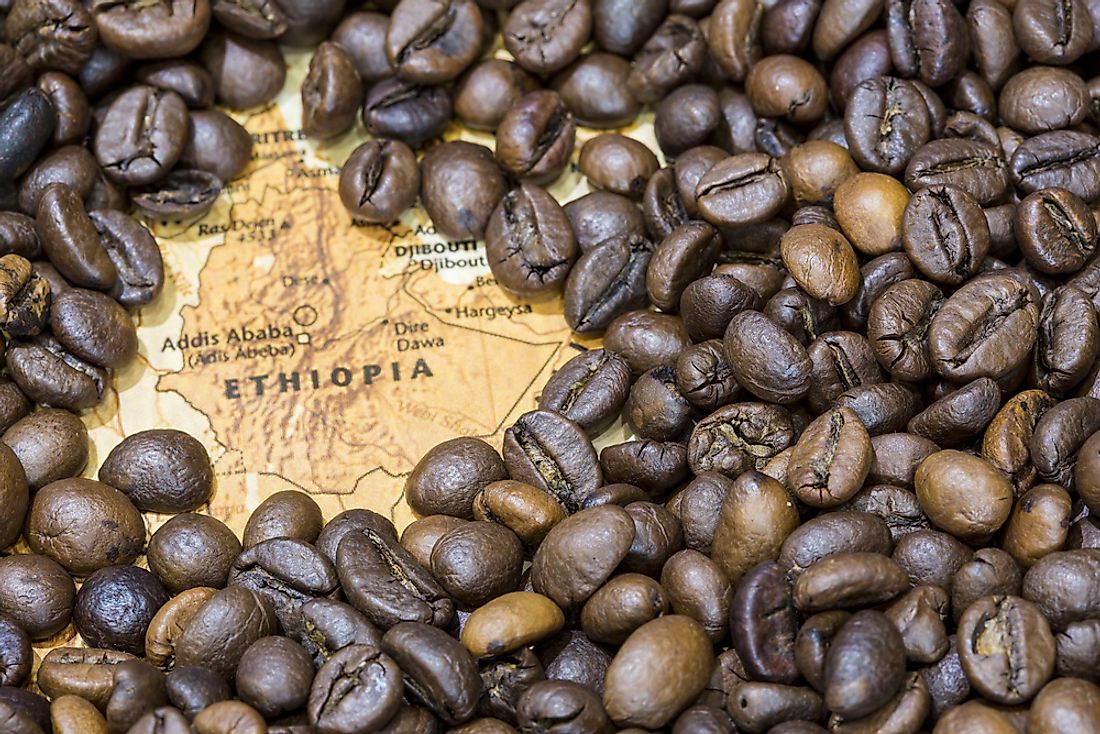The Top 10 Exports Of Ethiopia

The economy of Ethiopia has experienced growth in the past few decades and averaged about 10.3% of growth in the period 2005/2006 to 2015/2016. The average growth in the region was about 5.4%. The country’s growth was bolstered by the expansion in agriculture and other sectors such as construction and services. Trade played a moderate role in the country’s economy, and the value of both imports and exports equaled 36% of the GDP. Some of the top exports in Ethiopia include coffee, oily seeds, gold, dried legumes, and cut flowers among other commodities.
Coffee
Coffee is the 117th most traded product in the world consumed by people located in all corners of the planet. Ethiopia has been growing coffee for centuries, and it is the birthplace of Coffea Arabica. Up to 15 million people rely on coffee production for their daily sustenance. Ethiopia exported coffee worth $881 million in 2016/2017 with America being its biggest market. The export increased 13.5% from the previous period, and it is currently Africa’s largest producer of the commodity. The country is now targeting annual revenue of $2 billion by the period 2019/2020, and this implies the country has to increase production from the current 400,000 tones to 1 million tons.
Vegetables
Ethiopia is known for growing a wide range of vegetables that include green beans, snow peas, broccoli, asparagus, okra, cabbages, cauliflower, and eggplant among others. Extensive irrigation and a vast workforce support vegetable growing. Vegetable exports brought in $538 million in 2017.
Oil Seeds
Ethiopia grows high-value oilseeds that are coveted around the world, and are in high demand. The seeds produced in Ethiopia include sesame seeds, mustard, pumpkin, sunflower, rapeseed, castor seed, and groundnuts. Oilseeds accounted for $446 million in exports for the year 2017.
Live Trees and Flowers
Tree and flower cuttings have been in high demand in the world, and Ethiopia has been able to meet this opportunity by growing the products individually for export in many parts. These range from ornamental foliage, bulbs, roots and cut flowers. Ethiopia earned $221 million from the trading of tree and flower cuttings in 2017.
Precious Metals
Ethiopia produces precious metals like gold, copper, nickel, chrome, manganese, niobium, tantalum, and platinum among others. The high demand for these minerals has boosted the Ethiopian economy as it accounted for $125 million of export revenue in 2017.
Other Exports
Other exports that contribute to Ethiopia's economy include meat that ranges from beef, mutton, and goat bringing in about $97 million. Rawhides and leather also form another source of export revenue bringing in approximately $74 million. Live animals, electric machinery and local footwear designs like Enzi also contribute a substantial amount to exports.
Future Prospects
Ethiopia has positioned itself in the world market as a major player in trade despite being located in an area with harsh climatic conditions and unstable neighbors, besides being a landlocked country. The country has been on a steady growth since 2004 posting the highest growth per capita figures not seen anywhere else on the continent. This growth has been attributed to an improved attitude towards agriculture and a construction boom that has seen many parts that used to be remote getting access to vital facilities. Foreign investors have also played a role in this expansion as they have helped set up processing plants that have made it possible for export products to attain internationally accepted standards and in the process putting the country on the world map.
The Top 10 Exports Of Ethiopia
| Rank | Export Product | % Of Total Export |
|---|---|---|
| 1 | Coffee | 24% |
| 2 | Other Oily Seeds | 14% |
| 3 | Gold | 11% |
| 4 | Dried Legumes | 8.7% |
| 5 | Cut Flowers | 5.8% |
| 6 | Gas Turbines | 4.6% |
| 7 | Microscopes | 3.1% |
| 8 | Sheep and Goat Mear | 2.9% |
| 9 | Tanned Sheep Hides | 1.5% |
| 10 | Tanned Goat Hides | 1% |











